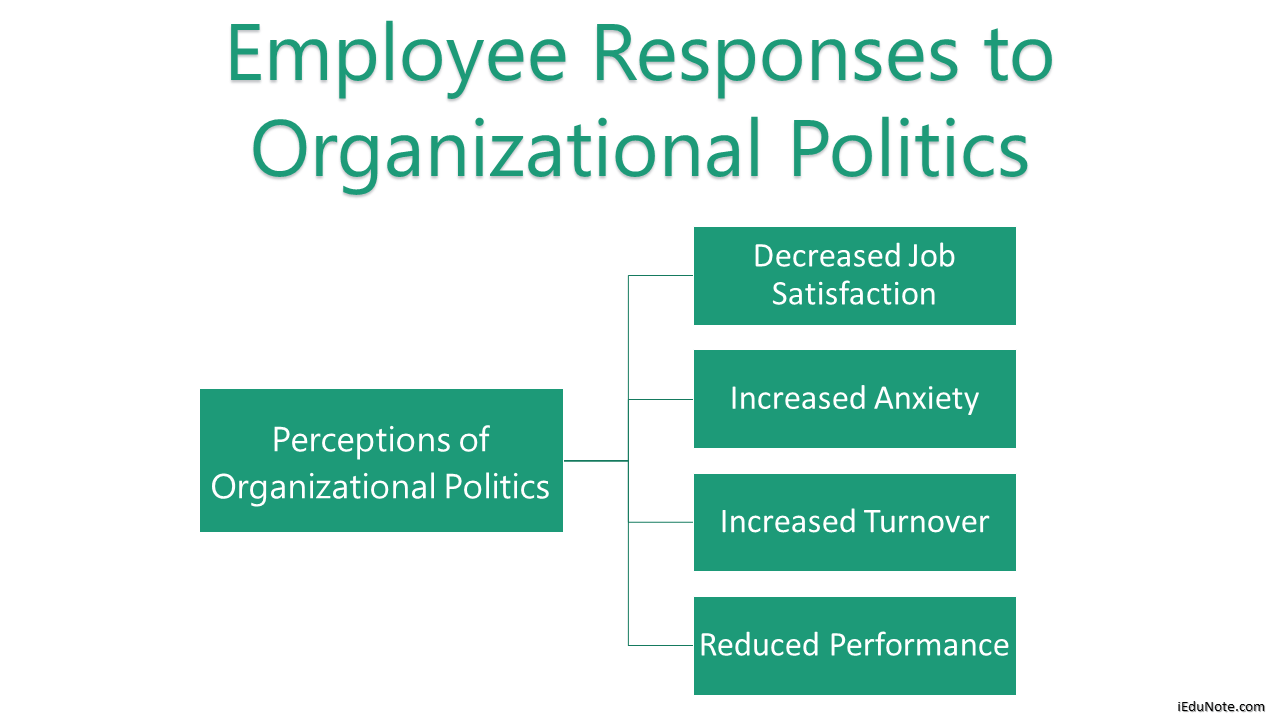For most people – who have modest political skills or are unwilling to play the politics game – outcomes tend to be predominantly negative. Let’s summarize the extensive research on the relationship between the perception of organizational politics and individual outcomes.
- There is very strong evidence indicating that perceptions of organizational politics are negatively related to job satisfaction.
- The perception of politics leads to anxiety or stress. When it gets too much to handle, employees quit.
- It is a de-motivating force, and performance may suffer as a result.
- The effect of politics is moderated by the knowledge the individual has of the decision-making system and his/her political skills;
- With high political skills, individuals often have improved performance.
- Low political skills individuals often respond with defensive behaviors— reactive and protective behaviors to avoid action, change, or blame.
- Reaction to organizational politics is also moderated by culture. In countries that are more unstable politically, workers will tolerate higher levels of politicking than in more politically stable countries.

In addition to the above conclusions, several interesting qualifiers have been noted.
First, the politics-performance relationship appears to be moderated by an individual’s understanding of the “hows” and “whys” of organizational politics.
An individual who has a clear understanding of who is responsible for making decisions and why they were selected to be the decision-makers would have a better understanding of how and why things happen the way they do than someone who does not understand the decision making process in the organization.
When both politics and understanding are high, performance is likely to increase because the individual will see political actions as an opportunity.
This is consistent with what you might expect among individuals with well-honed political skills. But when understanding is low, individuals are more likely to see politics as a threat, which would hurt job performance.
Second, when politics is seen as a threat and consistently responded to with defensiveness, negative outcomes will eventually surface.
When people perceive politics as a threat rather than an opportunity, they often respond with defensive and reactive, and protective behaviors to avoid action, blame, or charge.
And defensive behaviors are often associated with negative feelings toward the job and work environment. In the short run, employees may find that defensiveness protects their self-interest.
But in the long run, it wears them down. Those who consistently rely on defensiveness find that, eventually, it is the only way they know how to behave.
At that point, they lose the trust and support of their peers, bosses, employees, and clients.
Generally, when people talk about someone becoming defensive in the context of a conversation, they mean that someone is engaging in emotionally defensive maneuvers designed to ward off they are having to experience some unwanted feeling or admit responsibility for some disowned act.
People acting defensively are essentially trying to protect themselves from feeling uncomfortable and from viewing themselves as a failure or otherwise in a negative light.
The following table provides some examples of these defensive behaviors:
| Avoiding Action | Over Conforming: Strictly interpreting your responsibility by saying things like, ‘The rules clearly state……” or “This is the way we’ve always done it”. Buck Passing: Transferring responsibility for the execution of a task or decision to someone else. Playing Ignorance: Avoiding an unwanted task by falsely pleading ignorance or inability. Stretching: Prolonging a task so that one appears to be occupied – for example, turning a two-week task into a four-month job. Stalling: Appearing to be more or less supportive publicly while doing little or nothing privately. |
| Avoiding Blame | Buffing: This is a nice way to refer to “covering your rear.” It describes the practice of rigorously documenting activity to project an image of competence and toughness. Playing Safe: Evading situations that may reflect unfavorably. It includes taking on only projects with a high probability of success, risky decisions approved by superiors, qualifying expressions of judgment, and taking neutral positions in conflicts. Justifying: Developing explanations that lessen one’s responsibility for a negative outcome and/or apologizing to demonstrate remorse. Scapegoating: Placing the blame for a negative outcome on external factors that are not entirely blameworthy. Misrepresenting: Manipulation of information by distortion, embellishment, deception, selective presentation, or obfuscation. |
| Avoiding Change | Prevention: Trying to prevent a threatening change from occurring. Self-protection: Acting in ways to protect one’s self-interest during change by guarding information or other resources. |